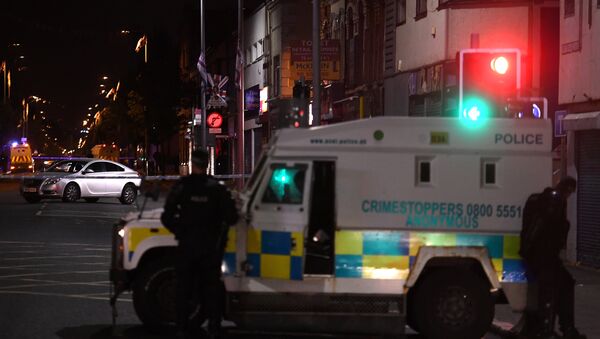On Wednesday, the local police said that six shots were fired and around 16 petrol bombs were thrown in what they called "a blatant bid to murder police officers" during a fourth night of unrest in Northern Ireland's second-largest city, Derry.
Moreover, the Police Service of Northern Ireland has confirmed that it had responded to two cars being set on fire on Upper Newtownards Road on the outskirts of Belfast.
Disturbances in Belfast and Londonderry on Eleventh Night https://t.co/JXn37pAh7m pic.twitter.com/4xadGqMnJt
— More UK News (@TweetMoreUKNews) 12 июля 2018 г.
"For a fourth consecutive night police officers dealt with violence and disorder," Chief Inspector Neil Beck said. No officers were reported injured.
What is happening in Belfast tonight? This is crazy! #bbcnews #bbcnewsline pic.twitter.com/zOSY1rdstf
— Gerry Carson (@GerryCarson) 11 июля 2018 г.
Wednesday's violence broke out amid a police warning that the Ulster Volunteer Force (UVF), loyalist paramilitaries involved in rioting, organized crime and drug dealing, were planning to "orchestrate and participate in serious disorder" in eastern Belfast.
Last night in Belfast pic.twitter.com/xB1ORoeThb
— Mick Finnegan (@Mick_Finnegan) 12 июля 2018 г.
The loyalists' violent move apparently came in response to plans to reduce the size of bonfires at two sites in eastern Belfast, which are traditionally lit in loyalist areas to celebrate July 12, a holiday marking Protestant King William's victory over the Catholic King James in the Battle of the Boyne in 1690, which established British and Protestant rule in Ireland.
Looks like the UVF have hijacked a bus and burnt it out.
— Craic-xit #FBPE 🇬🇧 🇪🇺 (@Craicxit) 11 июля 2018 г.
Belfast on bonfire night, ladies and gentlemen.#eleventhnight #Twelfth pic.twitter.com/BNgfAk0fSr
After hundreds of years under British rule, in the early 1920s Ireland split from the UK to become an independent state. This is when the population of Northern Ireland was divided into those who wanted to remain within the UK (unionists/loyalists who were mostly Protestant) and those who wanted to leave the UK and become part of a united Ireland (republicans, mostly Catholic).



